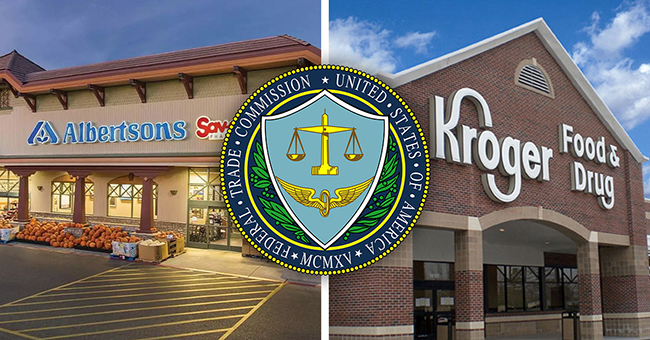NOSHscape: The Latest Food Brand News
Kroger/Albertsons vs The FTC: What Happens Next?
The next challenge for the proposed $24.6 billion merger between Kroger and Albertsons is coming from the federal government.
The Federal Trade Commission (FTC) announced on Feb. 26 it has filed a lawsuit to block the merger in the U.S. District Court for the District of Oregon, alongside a bipartisan group of nine attorneys general from Arizona, California, the District of Columbia, Illinois, Maryland, Nevada, New Mexico, Oregon and Wyoming.
According to the FTC, the commission investigating the merger’s anti-competitiveness unanimously voted (3-0) in favor of filing a temporary restraining order and preliminary injunction against the deal, which the agency argues eliminates competition in the grocery industry, and will lead to higher prices for consumers and harm the tens of thousands of workers employed by both corporations.
Even the supermarket’s executives have admitted to the anti-competitiveness of the deal, the FTC claims, highlighting in a release that one executive reacted to the deal by claiming: “you are basically creating a monopoly in grocery with the merger.”
The FTC emphasized that if the deal were completed, the combined companies would operate over 5,000 stores, 4,000 retail pharmacies and employ 700,000 workers across 48 states.
“This supermarket mega merger comes as American consumers have seen the cost of groceries rise steadily over the past few years,” said Henry Liu, Director of the FTC’s Bureau of Competition, in a press release. “Kroger’s acquisition of Albertsons would lead to additional grocery price hikes for everyday goods, further exacerbating the financial strain consumers across the country face today.”
But Albertsons reinforced its stance in a statement that the merger will “expand competition, lower prices, increase associate wages, protect union jobs, and enhance customers’ shopping experience;” Kroger echoed similar claims.
The FTC’s complaint holds that the two companies are direct competitors, but whether that matters in a grocery landscape that now sees non-direct competitors hold a significant share of the market remains a question likely to be debated by the court.
Both Kroger and Albertsons reemphasized their belief that rejecting the deal would harm their ability to compete against multi-channel retailers like Amazon, Walmart and Costco. The companies claim that by merging, the combined entity could offset these aforementioned group’s “growing dominance of the grocery industry” by ensuring local supermarkets can better compete.
February’s filing reveals that in addition to believing the merger reduces competition, FTC is challenging whether the previously announced divestiture plan with C&S Wholesale Grocers has the potential to be successful and allow the newly divested businesses to hold their own against their former parent organization.
The companies have said they plan to divest 400 stores, and can sell up to 650, to the wholesale and distribution company. The FTC claims the plan itself is “inadequate” and features a “hodgepodge of unconnected stores, banners, brands, and other assets that Kroger’s antitrust lawyers have cobbled together.”
C&S’s current share of the grocery market also remains up for debate. The FTC claims the Piggly Wiggly and Grand Union banner operator runs only 23 supermarkets, and a single retail pharmacy. Media reports have placed C&S’s total retail footprint at 160 locations. Either way, federal regulators believe the proposed divestiture does not create a “standalone business.”
If nothing else, the FTC’s suit ensures that any potential timeline for completing the merger will be stretched.
“This is a first step in order to slow things down,” explained Brian Albrecht, chief economist at the International Center for Law & Economics. “[This deal has] already been slowed down a bunch, but [now it is] the court saying they have to slow down.”
Albrecht believes the dispute between the regulator and the retailers must be over a significant number of markets. While there is always a chance that once divested, stores could fail under new ownership – as was the case when Albertsons divested stores to Haggen to appease regulators in its 2014 merger with Safeway – Albrecht, doesn’t believe that is a likely outcome.
He highlighted that it has become commonplace in recent years for grocers to create efficiencies by leaning heavily into vertical integration. Considering C&S specializes in wholesale distribution, he believes those existing operations could give newly divested stores a solid foundation for success.
Walmart has notably grown to become a leader in grocery since opening its first supercenter store in 1988, which saw it sell groceries for the first time. That same year was also the first, and last time, a supermarket merger has been challenged in court with American Stores and Albertsons’s acquisition of Lucky Stores. That means the last precedent set on competition in the grocery space is nearly 40 years old and came before many of today’s top players had entered the game.
There has been a lot more change to the landscape since then as well. Big box stores, discount chains and even dollar stores have also become grocery shopping venues, shifting how and where consumers buy food. Online grocery shopping has also evolved, albeit in more recent years, to become an important part of the food-buying landscape.
The changes to the market, including the landscape for grocery and the higher prices consumers have faced in recent years, will remain a central feature to both sides’ defense.
Both Kroger and Albertsons emphasized that they are willing to go to court for the deal. Given the current FTC’s track record, the federal regulator is also expected to put up a fight. That means the merger’s close date could be pushed out well beyond the anticipated August 17 date executives set earlier this year.
Meati: New CEO to Prioritize ‘Right Sizing’ Workforce Amidst New Round of Layoffs
Just two weeks into his tenure as CFO at Meati, Phil Graves received a promotion.
The mycelium root-based protein company in mid-February elevated Graves, a former Patagonia exec, to CEO, following the departure of president/COO Scott Tassani.
“This was a joint decision with Phil, the Board and [founder] Tyler [Huggins] to leverage Phil’s success in scaling mission-driven organizations,” said a spokesperson for Meati. “Phil brings deep expertise in financial management, strategic planning, and operational optimization, and his passion and skill for driving profitable growth is exactly what Meati needs now.”
Graves previously helped scale businesses including Patagonia, Wild Idea Buffalo, and Bass Pro Shops/Cabela’s. He most recently served as CEO of Wild Idea Buffalo and has expertise in driving profitable growth, financial management, strategic planning, and operational optimization.
While Graves is getting promoted, Meati is making cuts elsewhere. The company announced it is trimming 13% of its employees as Graves prioritizes “right sizing” the company’s workforce as part of its push toward profitability. The February layoffs are the only expected personnel changes currently, the spokesperson noted.
The news comes less than six months after the Boulder, Colo.-based company raised $50 million to give itself an “economic cushion” before proceeding to terminate 10% of its employees; the layoffs impacted 20% of the company, or 60 roles, but 30 were offered new positions within the business.
At the time, the company also decided to close its pilot scale production plant. All of these efforts have been made to put the protein player on a path toward profitability, which it now believes is in view.
“Meati has a clear path to profitability that includes aiming to be EBITDA positive within the next 12 months,” said a spokesperson. “Phil is focused on helping drive Meati to near-term profitability and responsible, sustainable growth as the company continues to disrupt the food industry by bringing MushroomRoot, a revolutionary, new protein to market.”
BFG Continues ‘Patient’ Approach With Fund III Launch
Keeping with its “every five years” timeline, better-for-you CPG investment firm Boulder Food Group (BFG) Partners, which counts brands like Olipop and Mid-Day Squares in its portfolio, is launching its third fund, targeting a $125 million pot.
The fund has already raised about 70% of its goal (about $87 million), and will center on seed- to series B-stage companies with typical check sizes of between $3 million and $5 million, said managing partner Dayton Miller.
BFG operates at its best when it can be one of the first institutional investors into a business in the early stage where “there’s a lot of action that happens,” Miller added. BFG’s portfolio strategy is centered around a rough schedule of five years to invest the fund’s pool of capital and another five years of possible follow-on investments.
The firm has incrementally increased its fund size: its $54 million Fund I launched in 2014, followed by $108 million in its 2019 Fund II.
Founded by former Bear Naked COO Tom Spier, the firm’s strategy has been “very patient and very methodical” in its placement of capital, Miller said. “Hopefully, we’re not too influenced by the winds of any given day.”
Pulling from their collective experience leading CPG companies, Spier and Miller – former CEO of Function beverages – “have a real appreciation for how hard it is” for founders and “empathy” for brands.
After sticking to consumables in Fund I, BFG took a step into personal care products in Fund II, where it saw a lot of deal flow happening. The firm wanted to explore the synergy between natural channel consumers of food and beverage brands and certain sectors of personal care products. With successful exits from hair care company Curlsmith to Helen of Troy and skincare maker ZitSticka to Heyday, Miller said BFG feels it has “earned the right” to continue to invest in the sector.
Yet, the investment group is still heavily focused on environmentally friendly and better-for-you food and beverage products.
In the last fund, BFG invested in rising CPG brands like Graza, Mid-Day Squares and Oats Overnight. The investment group has also made notable investments in Caulipower, MALK, Barnana, Bobo’s and Olipop. BFG has successfully exited food and beverage investments from Chameleon Cold Brew, with its sale to Nestlé in 2017 (later sold to SYSTM Foods) and, in 2020, Sovos Brands’ acquisition of Birch Benders (which changed hands again to Hometown Foodsthree years later).
BFG has taken a board seat in about half of the companies in its portfolio. Miller said BFG’s approach to consulting and advising its invested companies isn’t a “one-size-fits-all” approach, noting that “informal relationships” with founders can be “just as influential” as board seats.
Seeing as the investment climate has been particularly uncertain in the last year, BFG will be using a healthy amount of caution when preparing to deploy the new capital.
Where is the firm looking for its next big break?
BFG invested in Olipop in Fund II and is confident there will be more opportunity for products positioned around gut health. The subcategory continues to draw attention from consumers, producers and investors alike, especially, when paired with the intersection of GLP-1 drugs and CPG, Miller said.
Another possible opportunity for capital deployment could be brands that claim to improve brain health and provide mental clarity. Though BFG has not disclosed any investments for Fund III yet, it has been tracking the upward trend towards more food and beverage brands positioning around supporting cognitive health with low-sugar and fitness-oriented products.
Miller is especially interested in the link between “not only physical well being but also emotional well being and food.”
The strategy continues down the path laid by its previous interest and growth capital to primarily DTC brands MUD/WTR or Athletic Greens which have leaned into methods for reducing brain fog and glucose spikes.
Organic Chocolatier Alter Eco Announces Acquisition By Trek One Capital
Alter Eco has shifted hands once again.
Texas-based investment firm Trek One Capital announced on Feb. 1 its acquisition of the Fair Trade, regenerative confections and pantry staples producer, having officially closed the deal in December 2023. Terms were not disclosed.
The transaction coincides with a leadership shift. Arnulfo Ventura, who joined the company in 2022 from chip brand Beanfields, officially departed from the CEO role in September and was succeeded by Keith Bearden, an advisor to Alter Eco’s previous owner NextWorld Evergreen (NWE), ahead of the closing. Bearden was tasked with leading Alter Eco through the acquisition and will remain on as the company’s CEO.
“I look forward to my partnership with Trek One along with their support and commitment to take the Alter Eco premium brand of products to the next level,” Bearden said in a statement.
Alter Eco was founded in 2004 as a mission-based company to support cacao farmers in South America. The company boasts regenerative agriculture, organic and Fair Trade claims across its product lines, which includes chocolate bars, truffles, granola and quinoa products.
In 2017, Alter Eco was acquired from its co-founders Edouard Rollet and Mathieu Senard by strategic equity firm NWE. Following its acquisition by NWE, Rollet and Senard told Nosh that while it wasn’t the highest bid the company received, the brand’s stakeholders felt the evergreen fund was the right fit for Alter Eco and its mission since it had less pressure to quickly produce returns.
Under its ownership, Alter Eco launched its charitable arm, The Alter Eco Foundation, in 2020 to support dynamic agroforestry in the Amazon and help farmers adopt regenerative practices. The strategic equity firms’ portfolio also included similar purpose-minded brands like Mighty Leaf Tea and acai producer Sambazon.
Trek One, a newly established investment vehicle, counts Tejas Environmental Solutions, a waste water and salt water disposal service provider, as its only other portfolio company. According to operating partner and CFO Brian Fontana, the firm was created from a combination of family offices, existing businesses and investment vehicles.
Fontana was introduced to Alter Eco through an individual who was looking for a capital partner to help buy the business after NWE decided to divest its ownership stake. Trek One saw this acquisition as an opportunity to diversify its approach beyond the energy sector, but Fontana said it has no immediate plans to expand further into food and beverage.
Alter Eco has moved its headquarters from San Francisco to Houston, Texas. The company’s entire labor force worked remotely prior to the deal, and Fontana said all full-time employees will remain with the company, but certain finance and accounting contractors have been eliminated due to redundancies with Trek One’s in-house capabilities. As it looks ahead, Fontana said the primary focus will be expanding Alter Eco’s distribution beyond its traditional roots in natural and specialty stores.
“The previous owners either didn’t want to focus on growth [or] they were happy with the consistency of the annual revenue and turnover that the company had,” said Fontana. “There’s a capital requirement to expand the business, and … our focus is to provide the capital and the leadership to expand the business to other markets in addition to expanding the product offering itself.”
Going Vertical: RIND Snacks Acquires Granola Producer
Making the leap from building a brand to growing a business sometimes means controlling one’s destiny.
RIND Snacks is attempting to do just that by creating a vertically integrated production model with the acquisition of Vermont-based granola company Small Batch Organics. Along with leveraging the producer’s manufacturing muscle, RIND has also leased a 15,000 sq. ft. warehouse in neighboring Bennington, Vermont, where it will handle its own logistics and fulfillment. The terms of the both deals were not disclosed.
Officially RIND closed on the Small Batch sale in October, but merging the two companies’ supply chains and operations is not something that happens overnight, RIND co-founder and CEO Matt Weiss told Nosh.
“Like most brands, we’ve relied on third parties; whether it’s product developers, co-manufacturers, 3PLs, et cetera,” he said. “It’s an exciting new step in RIND’s evolution from a dried fruit snack brand to a dynamic, diversified and vertically integrated snack platform.”
Though it did not need new investment to acquire Small Batch, RIND saw the opportunity to raise new capital as a way to “allow additional runway to really hit the ground running” and “play offense” as it moves into self-manufacturing, Weiss said.
Although the specifics of the Series A extension have not been made public at this point, RIND confirmed that The Angel Group, RCV Frontline — the venture arm of JPG Resources — and FABID founder Ryan Williams (a previous investor) have all added investment in recent months.
The former two investment groups bring a wealth of knowledge and expertise from the founder-operator perspective and, in the case of RCV, a breadth of experience in manufacturing and product innovation.
This will be integral as RIND moves into a self-manufacturing model; yet, the dried fruit snack maker will not be alone. It has retained all of Small Batch’s labor force — founder Lindsey Martin and one full-time employee — as well as a part-time staff of about 15 to 20 employees. Weiss also added that RIND’s staff of now nine full-time employees might expand as it grows the business this year.
Founded in 2015, Small Batch has operated predominately as a private label producer and co-manufacturer of granola products but had recently branched out into branded offerings with distribution in select Costco and Whole Foods locations.
“This [acquisition] is one plus one equals four,” Weiss said, and will allow RIND to not only dictate its production and innovation streams but also “extend into adjacent categories.”
Since its launch in 2018, RIND has operated as an asset-light, speed-to-market snack brand reliant on co-mans and a variety of service providers to help the business grow. It will maintain some production redundancies with co-packers for now but is expecting to integrate about 90% of all production to its Vermont facility throughout 2024.
The addition of the Small Batch capabilities is already showing an increase in profitability for RIND, Weiss said. As the company “recaptures its value chain,” it is expected to improve its gross margin by 15 percentage points while also expanding into new day parts with product innovation.
Though there is a variety of new offerings that RIND is planning to launch throughout the year, including a whole new line that will be unveiled at Expo West, the first new product is an extension of its Remix line. The Cherry Cashew Crunch features upcycled dried cherries, spiced cashews and, in a first for the company, vanilla granola.
The new Remix variety will be available in all Sam’s Clubs locations to start and will be followed shortly thereafter in Wegmans, Hudson News and select Walmarts, among others.
While maintaining some of Small Batch’s co-manufacturing business, RIND will be “opportunistic” in private label opportunities that are “non-competitive and non-dilutive,” Weiss said.
In saying that, Weiss added that moving production in-house will allow the company more flexibility to co-develop products with its strategic retailer partners like Walmart, Target and Costco.
“You have a manufacturing portfolio of what you can do and templates you can build,” he said. “That is a huge growth opportunity for us in revenue and expands our TAM [total addressable market] dramatically.”
RIND was founded to address food waste, using overripe or not able to sell produce and diverting the whole fruits into a healthy snack. The company claims to eliminate over one million pounds of otherwise discarded fruit every year. RIND’s whole portfolio is Upcycled Certified and the addition of Small Batch’s production capabilities fits into this sustainability mission. Both the recently acquired facility and the new fulfillment warehouse run on 100% solar energy and use renewable packaging solutions.
Or as Weiss put it: “RIND acquired a ‘green’ company in the Green Mountain State.”


Receive your free magazine!
Join thousands of other food and beverage professionals who utilize BevNET Magazine to stay up-to-date on current trends and news within the food and beverage world.
Receive your free copy of the magazine 6x per year in digital or print and utilize insights on consumer behavior, brand growth, category volume, and trend forecasting.
Subscribe



